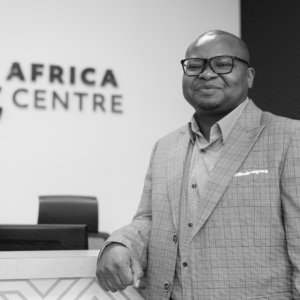Honouring Cultural Perspectives in Financial Literacy and Education

Community grants fund initiatives that centre the diverse lived experiences of Albertans — from helping new immigrants navigate unfamiliar Canadian financial systems to supporting Indigenous students in healing their relationship with money.
For immigrants starting a new life in Alberta, there can be lots to adapt to — whether it’s frigid winter weather or the long distance from friends and family.
Many also discover the financial and economic systems of their new country are very different from what they previously knew.
“Money and financial issues in many places in the Global South exist in the informal economy,” says Samuel Juru, executive director of the Africa Centre, a non-profit organization based in Edmonton and serving communities of African descent across Alberta.
“Government regulations and things like having an annual tax regime is limited to big business participation. In Canada, however, that tax regime and system exist at the individual and household level.”
As a recipient of an AIMCo Foundation for Financial Education community grant, the Africa Centre is helping newcomers and others navigate Canada’s tax structures and broader financial systems, in partnership with the Financial Empowerment Initiative.
An accessible entry point into more comprehensive financial education, free tax clinics held daily through the busy tax season recently reached approximately 800 community members.
The process helps people reconcile the difference between what they’ve earned and how much they’ve been taxed throughout the year. It also ensures that community members who are entitled to programs such as the Canada Child Tax Benefit or the Carbon Tax Rebate have access to them.
“Your inability to do something as simple as pay for an accountant to help with your taxes has a lot of implications in terms of your general ability to balance out, and implications on the citizen in terms of downstream participation,” says Juru.
The process also helps community members better understand the broader Canadian financial system and how they can operate within it. The tax clinics are staffed by Black accountants with professional designations. Juru says that finances are a personal matter — some newcomers might see filing taxes as an overreach by the government into personal affairs. Others might be embarrassed by their financial situation.
Sitting across from an accountant who looks like their clients, and may have some of the same life experiences, reduces barriers such as fear or discomfort, which can prevent full economic participation, says Juru.
The tax clinic is also viewed as an opening for clients to discover other financial empowerment programs. Tayo El-Nathan, executive director of the Financial Empowerment Initiative, says those programs tackle issues such as budgeting, best practices for running a small business, and paying down debt.
Fundamentally, they’re about changing people’s attitudes towards money.
“For many immigrants, it feels like things happen to us. The war happened and it hit us. Once things happen to you, you find yourself just trying to make sense of it,” says El-Nathan. “We want to see success stories of savings, property ownership, stability, and growth. Having a financial future — that is something you built — not something that just happened to you.”
Culture is Key to Healing Relationships with Money
The idea of changing a person’s outlook on their finances is something Jasmine Blood brings to her work that connects her with another demographic — Indigenous students, whose ancestors have lived on the lands of Alberta since time immemorial.
As the Indigenous Financial Coach at Bow Valley College in Calgary, a position supported by the AIMCo Foundation, Blood helps students navigate the world of scholarship and grant applications. She also helps students explore the historical context that affects their relationships with money.
Indigenous people in Canada face complex challenges including the ongoing impacts of residential schools, which have left generations of Indigenous people with trauma that affects their daily lives, and colonial policies like the Indian Act, which systemically excluded Indigenous people from full participation in the Canadian economy. These issues, among other barriers, have contributed to higher poverty levels amongst Indigenous people in Canada, as well as less generational wealth being transferred to younger generations.
At the same time, Blood — who is Niitsitapi (Blackfoot) — describes different cultural attitudes towards wealth.
“We believe that people are born with a purpose. Everyone has their own skills, gifts, talents, and abilities that will shape them in a way to help society. Wealth is measured by family connections and how you contribute to community.”
Using that outlook, Blood urges students to focus on building their self-esteem and investing in themselves and their passions, as part of a path to overall well-being.
“Your financial success is correlated to your self-esteem. When people have low self-esteem, it will affect their finances because they’re more prone to self-sabotage, or they don’t feel worthy, so they don’t invest in themselves.”
Blood, who has held the position since 2022, recalls working with a young student who had been allowing several relatives to stay in her home without paying for rent or food. Blood didn’t know it at the time, but the student had also been dealing with an addiction.
The student recently visited Blood and shared that the workshops had helped her take steps to change her life, including setting boundaries with her family. The student is now sober.
“Students are not just walking away with budgeting skills. They’re walking away with self-worth, confidence, and self-awareness,” says Blood.
“I could show them how to budget but nothing’s going to change unless their thoughts about and relationship with money change first.”
Learn more about our community grant recipients and browse our impact report, Empowering Equity, to see all we accomplished together in 2023.
